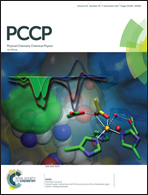Triplet-sensitized photon upconversion in deep eutectic solvents†
Abstract
Photon upconversion (UC) is a technology that can increase solar utilization efficiencies in broad photoenergy conversion systems by converting lower-energy photons into usable higher-energy photons. Recently, UC using triplet–triplet annihilation (TTA) of organic molecules has drawn attention because it is presently the only method applicable to weak and noncoherent light. To date, many attempts have been made to realize this UC technology in forms suitable for applications, but they typically suffer from either high cost or insufficient stability and/or safety of materials. Recently, a new class of liquid called deep eutectic solvents (DESs) has emerged as low-cost green fluids that possess low toxicity and vapor pressure, biodegradability, and high thermal stability. DESs have been proposed as an alternative to ionic liquids. This article develops triplet-sensitized UC samples using DESs that are found to be suitable solvents for this purpose, attaining a new materials platform for UC with the aforementioned advantages. The high thermal stability of the samples is qualitatively confirmed and their UC quantum yields are determined to be 0.11–0.21 (based on the definition that the maximum quantum yield is 0.5) depending on the DES composition. The triplet lifetime of the emitter 9,10-diphenylanthracene increases with DES viscosity, resulting in unique kinetics. Analysis of photophysical experimental results allows the relevant physics governing the performance of this sample system to be determined and discussed. Overall, a novel UC platform that simultaneously achieves high thermal stability, low cost, and environmental friendliness is developed using DESs as the solvent.



 Please wait while we load your content...
Please wait while we load your content...